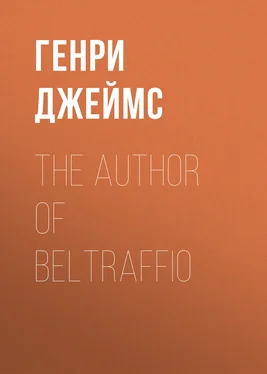Генри Джеймс - The Author of Beltraffio
Здесь есть возможность читать онлайн «Генри Джеймс - The Author of Beltraffio» — ознакомительный отрывок электронной книги совершенно бесплатно, а после прочтения отрывка купить полную версию. В некоторых случаях можно слушать аудио, скачать через торрент в формате fb2 и присутствует краткое содержание. Жанр: foreign_prose, foreign_antique, на английском языке. Описание произведения, (предисловие) а так же отзывы посетителей доступны на портале библиотеки ЛибКат.
- Название:The Author of Beltraffio
- Автор:
- Жанр:
- Год:неизвестен
- ISBN:нет данных
- Рейтинг книги:3 / 5. Голосов: 1
-
Избранное:Добавить в избранное
- Отзывы:
-
Ваша оценка:
- 60
- 1
- 2
- 3
- 4
- 5
The Author of Beltraffio: краткое содержание, описание и аннотация
Предлагаем к чтению аннотацию, описание, краткое содержание или предисловие (зависит от того, что написал сам автор книги «The Author of Beltraffio»). Если вы не нашли необходимую информацию о книге — напишите в комментариях, мы постараемся отыскать её.
The Author of Beltraffio — читать онлайн ознакомительный отрывок
Ниже представлен текст книги, разбитый по страницам. Система сохранения места последней прочитанной страницы, позволяет с удобством читать онлайн бесплатно книгу «The Author of Beltraffio», без необходимости каждый раз заново искать на чём Вы остановились. Поставьте закладку, и сможете в любой момент перейти на страницу, на которой закончили чтение.
Интервал:
Закладка:
“Stay with me, darling,” Mrs. Ambient said to the boy, who had surrendered himself to his father.
Mark paid no attention to the summons but Dolcino turned and looked at her in shy appeal, “Can’t I go with papa?”
“Not when I ask you to stay with me.”
“But please don’t ask me, mamma,” said the child in his small clear new voice.
“I must ask you when I want you. Come to me, dearest.” And Mrs. Ambient, who had seated herself again, held out her long slender slightly too osseous hands.
Her husband stopped, his back turned to her, but without releasing the child. He was still talking to the vicaress, but this good lady, I think, had lost the thread of her attention. She looked at Mrs. Ambient and at Dolcino, and then looked at me, smiling in a highly amused cheerful manner and almost to a grimace.
“Papa,” said the child, “mamma wants me not to go with you.”
“He’s very tired—he has run about all day. He ought to be quiet till he goes to bed. Otherwise he won’t sleep.” These declarations fell successively and very distinctly from Mrs. Ambient’s lips.
Her husband, still without turning round, bent over the boy and looked at him in silence. The vicaress gave a genial irrelevant laugh and observed that he was a precious little pet. “Let him choose,” said Mark Ambient. “My dear little boy, will you go with me or will you stay with your mother?”
“Oh it’s a shame!” cried the vicar’s lady with increased hilarity.
“Papa, I don’t think I can choose,” the child answered, making his voice very low and confidential. “But I’ve been a great deal with mamma to-day,” he then added.
“And very little with papa! My dear fellow, I think you have chosen!” On which Mark Ambient walked off with his son, accompanied by re-echoing but inarticulate comments from my fellow-visitor.
His wife had seated herself again, and her fixed eyes, bent on the ground, expressed for a few moments so much mute agitation that anything I could think of to say would be but a false note. Yet she none the less quickly recovered herself, to express the sufficiently civil hope that I didn’t mind having had to walk from the station. I reassured her on this point, and she went on: “We’ve got a thing that might have gone for you, but my husband wouldn’t order it.” After which and another longish pause, broken only by my plea that the pleasure of a walk with our friend would have been quite what I would have chosen, she found for reply: “I believe the Americans walk very little.”
“Yes, we always run,” I laughingly allowed.
She looked at me seriously, yet with an absence in her pretty eyes. “I suppose your distances are so great.”
“Yes, but we break our marches! I can’t tell you the pleasure to me of finding myself here,” I added. “I’ve the greatest admiration for Mr. Ambient.”
“He’ll like that. He likes being admired.”
“He must have a very happy life, then. He has many worshippers.”
“Oh yes, I’ve seen some of them,” she dropped, looking away, very far from me, rather as if such a vision were before her at the moment. It seemed to indicate, her tone, that the sight was scarcely edifying, and I guessed her quickly enough to be in no great intellectual sympathy with the author of “Beltraffio.” I thought the fact strange, but somehow, in the glow of my own enthusiasm, didn’t think it important it only made me wish rather to emphasise that homage.
“For me, you know,” I returned—doubtless with a due suffisance —“he’s quite the greatest of living writers.”
“Of course I can’t judge. Of course he’s very clever,” she said with a patient cheer.
“He’s nothing less than supreme, Mrs. Ambient! There are pages in each of his books of a perfection classing them with the greatest things. Accordingly for me to see him in this familiar way, in his habit as he lives, and apparently to find the man as delightful as the artist—well, I can’t tell you how much too good to be true it seems and how great a privilege I think it.” I knew I was gushing, but I couldn’t help it, and what I said was a good deal less than what I felt. I was by no means sure I should dare to say even so much as this to the master himself, and there was a kind of rapture in speaking it out to his wife which was not affected by the fact that, as a wife, she appeared peculiar. She listened to me with her face grave again and her lips a little compressed, listened as if in no doubt, of course, that her husband was remarkable, but as if at the same time she had heard it frequently enough and couldn’t treat it as stirring news. There was even in her manner a suggestion that I was so young as to expose myself to being called forward—an imputation and a word I had always loathed; as well as a hinted reminder that people usually got over their early extravagance. “I assure you that for me this is a red-letter day,” I added.
She didn’t take this up, but after a pause, looking round her, said abruptly and a trifle dryly: “We’re very much afraid about the fruit this year.”
My eyes wandered to the mossy mottled garden-walls, where plum-trees and pears, flattened and fastened upon the rusty bricks, looked like crucified figures with many arms. “Doesn’t it promise well?”
“No, the trees look very dull. We had such late frosts.”
Then there was another pause. She addressed her attention to the opposite end of the grounds, kept it for her husband’s return with the child. “Is Mr. Ambient fond of gardening?” it occurred to me to ask, irresistibly impelled as I felt myself, moreover, to bring the conversation constantly back to him.
“He’s very fond of plums,” said his wife.
“Ah well, then, I hope your crop will be better than you fear. It’s a lovely old place,” I continued. “The whole impression’s that of certain places he has described. Your house is like one of his pictures.”
She seemed a bit frigidly amused at my glow. “It’s a pleasant little place. There are hundreds like it.”
“Oh it has his tone ,” I laughed, but sounding my epithet and insisting on my point the more sharply that my companion appeared to see in my appreciation of her simple establishment a mark of mean experience.
It was clear I insisted too much. “His tone?” she repeated with a harder look at me and a slightly heightened colour.
“Surely he has a tone, Mrs. Ambient.”
“Oh yes, he has indeed! But I don’t in the least consider that I’m living in one of his books at all. I shouldn’t care for that in the least,” she went on with a smile that had in some degree the effect of converting her really sharp protest into an insincere joke. “I’m afraid I’m not very literary. And I’m not artistic,” she stated.
“I’m very sure you’re not ignorant, not stupid,” I ventured to reply, with the accompaniment of feeling immediately afterwards that I had been both familiar and patronising. My only consolation was in the sense that she had begun it, had fairly dragged me into it. She had thrust forward her limitations.
“Well, whatever I am I’m very different from my husband. If you like him you won’t like me. You needn’t say anything. Your liking me isn’t in the least necessary!”
“Don’t defy me!” I could but honourably make answer.
She looked as if she hadn’t heard me, which was the best thing she could do; and we sat some time without further speech. Mrs. Ambient had evidently the enviable English quality of being able to be mute without unrest. But at last she spoke—she asked me if there seemed many people in town. I gave her what satisfaction I could on this point, and we talked a little of London and of some of its characteristics at that time of the year. At the end of this I came back irrepressibly to Mark.
Читать дальшеИнтервал:
Закладка:
Похожие книги на «The Author of Beltraffio»
Представляем Вашему вниманию похожие книги на «The Author of Beltraffio» списком для выбора. Мы отобрали схожую по названию и смыслу литературу в надежде предоставить читателям больше вариантов отыскать новые, интересные, ещё непрочитанные произведения.
Обсуждение, отзывы о книге «The Author of Beltraffio» и просто собственные мнения читателей. Оставьте ваши комментарии, напишите, что Вы думаете о произведении, его смысле или главных героях. Укажите что конкретно понравилось, а что нет, и почему Вы так считаете.












